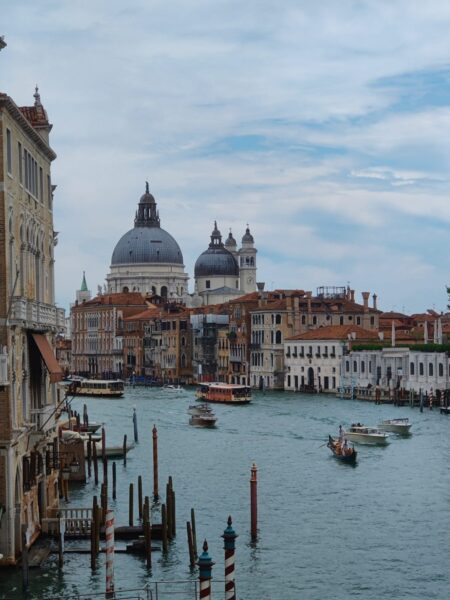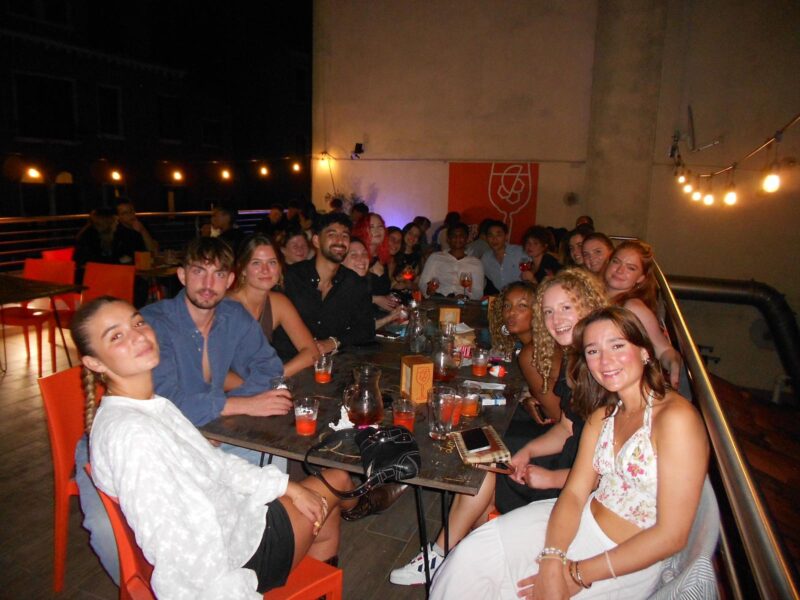
Gondolas, bridges and an endless maze of canals: not quite what you see on your way to Streatham campus! I have just started my second semester at Venice International University, where I am joined by 140 other students from Exeter and many other universities around the world. I had set my sights on a year’s study abroad since before applying to Exeter; I was in search of an alternative university experience, one that would broaden my horizons both personally and academically. The idea of meeting new people, trying new food and finding a study area other than the Forum library sounded very appealing! At the time, however, I didn’t quite realise all the benefits and opportunities this adventure would bring.
Embarking on a year abroad enables you to bridge the gap between being a tourist and a local. Unlike a tourist who only has time to scratch the surface, as a student you are able to immerse yourself into the culture, establish routines, discover hidden gems, and create a sense of attachment to the area. However, there is still an ephemerality to your resident status, meaning that you are always keen to actively discover and learn about the environment and communities around you, making your time in the area more impactful and meaningful. This unique position provides you with a blend of experiences and perspectives that neither a tourist nor a local would be able to achieve, thus fostering a deeper appreciation for cultural differences and diverse worldviews.
Just yesterday, I spent several hours ambling aimlessly around San Polo and Dorsoduro (two of Venice’s districts) with my camera in hand. I was not in a rush to see all the sights like the swarms of tourists were. At the same time, I was able to appreciate the beautiful architecture and views surrounding me; something that the locals may now take for granted during their daily commute. The intricate lacework of the gothic arches, the weathered statues and cisterns, together with the majestic palazzos and countless cobbled bridges just confirmed that there is no place quite like Venice.

Engaging with the local communities and landmarks has also been an eye-opening experience and has provided me with first-hand insights into the area’s history, traditions and quotidian. For instance, in November, I was able to take part in the festivities of a Venetian bank holiday celebrating the end of a plague: the Feast of the Madonna della Salute. This involved educating myself on Italy’s 17th century plague epidemics, crossing a temporary pontoon bridge over the Grand Canal and sampling numerous sweet pastries on sale at the food stalls, without falling prey to the ubiquitous commercialism brought on by tourism. Unlike the ‘famous’ popular events, such as the Venice Carnival, this was a much more low-key outing, primarily enjoyed by the local population.
Adventures outside of Venice have equally made my time in Italy incredibly memorable. Whether it be during a weekend in Florence with a large group of friends, or a solo trip to Padua, I have made the most of my free days to explore the wonders surrounding Venice. The visits to well-known sights, such as The Birth of Venice by Botticelli in the Uffizi Museum or Padua’s Basilica of St. Anthony, as well as the discovery of more obscure places, like Treviso or Bassano del Grappa, mean that these weekends away have given me a well-rounded knowledge of Northern Italy. I am hoping to return to Italy after my year abroad in order to explore Central and Southern Italy!
Some of my favourite parts about studying abroad, however, have been the small details that I will reminisce about long after I return to Exeter: the morning cappuccinos at my local café, the time my friend fell in the canal, the glorious sunsets I see on the vaporetto (public transport boats) whilst travelling back from San Servolo, the small island which houses my university, and the peace and quiet on my night time walks when I finally have St Mark’s Square and Rialto Bridge all to myself. These little Venetian gems will be what makes my year abroad like no other.
Some of my favourite parts about studying abroad, however, have been the small details that I will reminisce about long after I return to Exeter.

This experience is also widening my academic horizons; it has enabled me to study subjects which are not on offer in Exeter but which greatly complement my Archaeology and Anthropology degree. “Natural Disasters in an Era of Rapid Climate Change” and the “Urban Linguistic Landscapes” spring to mind. These courses make an astute use of the local geography and urban characteristics of Venice to demonstrate ideas and concepts which are closely related to both disciplines. As well as this, I have been able to undertake two modules to learn Italian and thus found out that Italians speak with more than just hand gestures! By studying the language abroad, I have been able to practice my language skills in a real-life context, an experience that is slightly more useful than Duolingo… Learning a second or third language is an incredibly valuable asset in today’s interconnected world, therefore I hope that this new skill will also provide me with a useful advantage when looking for work in the ever more competitive globalised job market.
Some may be put off by adding an extra year to their degree but, so far, I have seen it as an incredibly valuable experience, both from a personal and an academic angle. I have certainly grown in independence and confidence, made many friends across the globe, and gained new perspectives, knowledge, and a scratch book of memories. I know that having appreciated a new way of life, seized the opportunities that have come my way and learnt to live in the present, I will come back to Streatham Campus completely refreshed, energised and raring to go to for my final year. Carpe diem!


